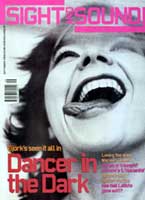Primary navigation

UK 2000
Reviewed by Mark Sinker
Our synopses give away the plot in full, including surprise twists.
London, the present. Ray is released from a psychiatric hospital into the care of his brother Pete, who runs their late father's café. Ray sees Laura and boyfriend Dave fighting in the street and intervenes. Dave hits him. Later, Ray sees Laura chuck Dave out, and woos her in a pub. Next day, they take a train to Hastings, explore a corn circle and have sex in a hotel. Pete is angry at Ray travelling to Hastings without telling him and gives him a kitchen job. Pete and waitress Mandy are falling in love. Pete brings Mandy home; they are interrupted by the sound of Ray and Laura in the bath.
Ray serves a customer a pizza sprinkled with some of his pills, enraging Pete. Ray moves in with Laura, who is pregnant by Dave. One night, she finds him semi-naked on the roof; he tells her he hears voices. The next morning, she finds him naked, recreating the corn circle with bin bags in the street. At Sunday lunch with Pete and Mandy, Ray is horrible; Laura leaves. Ray finds Laura and Dave apparently discussing a return to Glasgow. He attacks Dave and flees. Pete finds him brandishing a lighter, standing in the café's kitchen, which is doused in petrol. Ray tries to kill himself, but the lighter fails to work. He returns to hospital, Laura to Glasgow. Pete begins teaching Ray to cook.
Few UK rock groups mined the anti-pop values of failure, resignation and shelved ideals better than Squeeze. Doggedly unfashionable song-craftsmen, they occasionally delivered perfectly condensed essays about the ordinary griefs of unremarkable lives. In its strongest moments, this low-key tale of quotidian lunacy impacting on family and lovers achieves flashes of a similar urban sensibility. So much so that this debut film from television drama director Simon Cellan Jones (Cracker) is less productively read as an opening up of Joe Penhall's play, from which it's adapted, than as an opening up of the minor 1978 Squeeze hit 'Goodbye Girl', which plays over the film's falling-in-love moment and its closing moment of reflection.
Too often, film adaptations of stage plays involve sweepingly inessential camera prettiness intercut with room-bound head-to-head sequences. Sure enough, Some Voices includes a wheat-field-framed getting-to-know-you train trip to Hastings that Ray, recently released from a psychiatric hospital, and his friend Laura take, complete with a corn circle, fireworks and music interlude on an empty beach. Suddenly Ray and Laura are misunderstood kooks in love, staving off an unromantic world with a Françoise Hardy soundtrack. Yet one passage in this miscalculated section is rather cleverly used: Ray's away-day charm drawing sand-art corn circles replays as naked, squalid insanity back home, when he resculpts this circle with bin bags. The symmetry of the respective camera angles - we look down on Ray in the street from a high window just as the Hastings hotel overlooked the beach - lets the intractability of their now-entwined lives hit Laura (and us) as revealed pattern, even as Ray is relosing his reason, seeing signs of extra-terrestrial activity in patterns everywhere.
The seeming distraction of vérité vignettes of west London life - mountaineers, horse riders and athletes active under a dual-carriageway flyover - resemble the decorative imagery often used to open up talk-intensive stage plays for the screen. But these fleeting images, glimpsed by Ray, are less a correlative of any intended social realism than a subtly disorientating B-side to the main cinematic element, Ray's hallucinatory episodes, which play out as pixellated MTV/CCTV flicker, flashbacks to earlier episodes or to the television assaulting him in the psychiatric hospital.
With all reality's beauty and grace a hinted delusion, the veiled mood is one of freedom failing and making do, which the song makes historically particular. Tinnily jaunty, cyclical white-boy soul, 'Goodbye Girl' is a late-70s flash-forward to the manicured mid-80s electropop mainstream, but also, from our post-techno perspective, an effective time-car back into lost, wasted days. Emotion-through-pop - evasion-through-pop - remains a vigorous boysworld trope. Here, though, by treating the women as ciphers rather than prizes, the film as opened-up pop song brings about a focus on incestuous intensity, on brothers Ray and Pete's entrapment within mutual commitment to, anger at and love for one another. Which leaves normative romantic love - kowtowed to most obviously here in the Françoise Hardy-scored sequence - the preserve of nutters spotting aliens in the symmetry. The technically slick kitchen scene between Pete and his waitress Mandy, in which cookery nearly climaxes in a kiss, is another well-known romantic-comedy device. But it's effaced by its echo-variation, Pete's concluding kitchen-sink lesson for Ray on frying onions and mushrooms with basil.